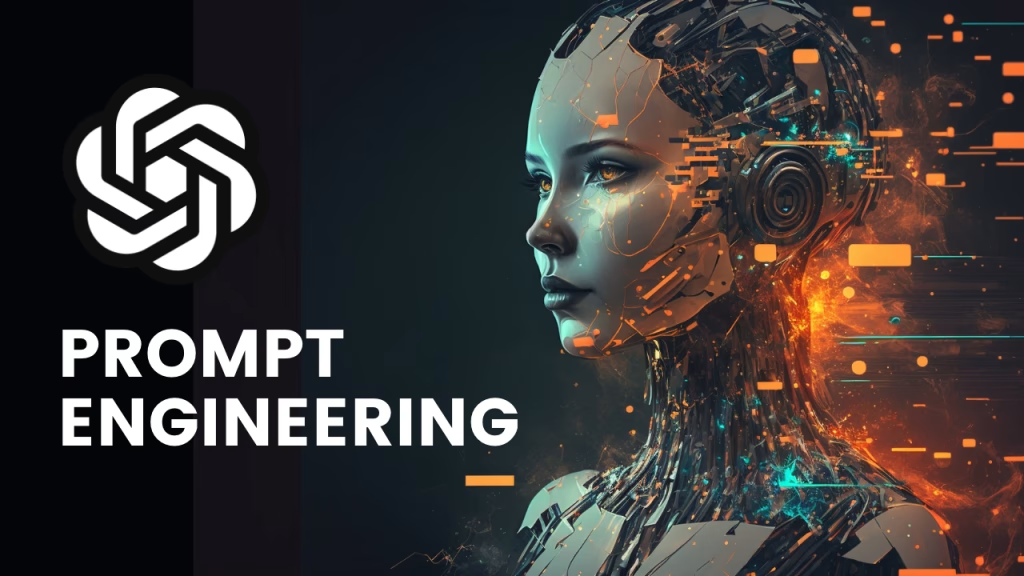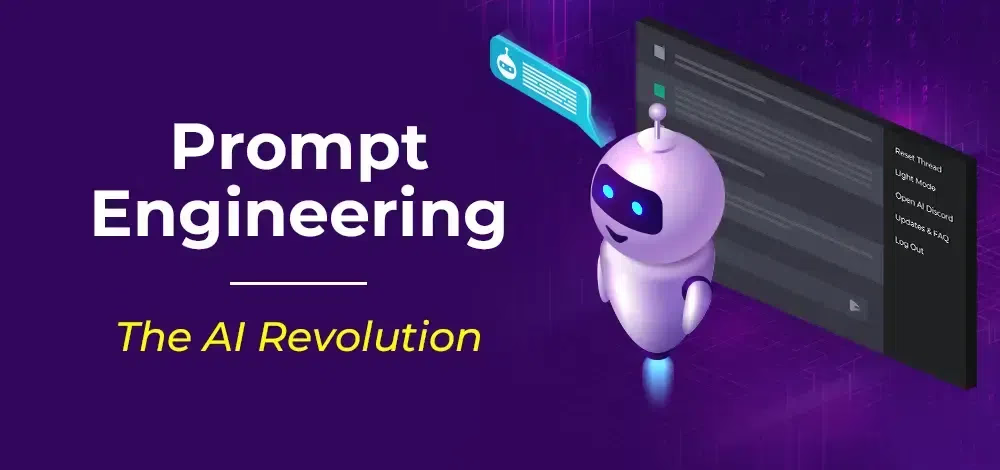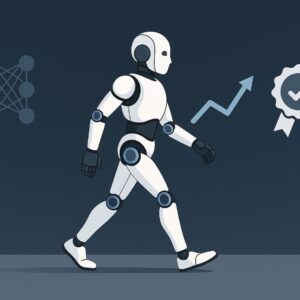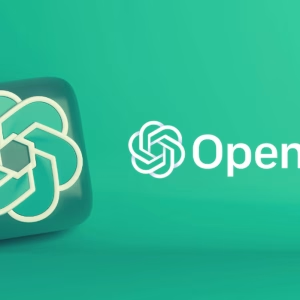Imagine you’re a culinary artist, and your canvas is a delicious plate of spaghetti marinara. The easy route is to grab a jar of pre-made sauce, but where’s the fun in that? Instead, you decide to embark on a culinary adventure, crafting your own unique sauce. Just like an artist carefully selecting their paints, you venture to the vibrant farmers’ market and meticulously pick the ripest, reddest tomatoes and the most fragrant basil leaves. The colors and aromas dance before your eyes and nostrils, inviting you to create a culinary masterpiece. But why stop there? Take it a step further and grow your own ingredients in your garden! Nurture those tomatoes until they’re plump and sun-kissed, pluck fresh basil leaves, and maybe even try your hand at making homemade pasta. With each step, your dish transforms from ordinary to extraordinary. This is the essence of prompt engineering in generative AI. It’s about taking the time to curate and create, infusing your unique touch into every aspect of the process. By doing so, you elevate the entire dining experience, not just for yourself but for anyone who gets to savor your culinary creation.
Prompt engineering is like being a master chef in the kitchen of AI. With careful curation and a dash of creativity, you can craft prompts that are truly delectable, training AI models that deliver mouth-watering results.
Better Ingredients, Better Results: The Magic of Prompt Engineering
Just like a master chef carefully selects the finest ingredients to create a delicious meal, prompt engineering is the secret ingredient that enhances the performance of generative AI (or Gen AI). By crafting precise and well-thought-out prompts (or inputs), prompt engineers can truly unlock the potential of Gen AI tools.

So, what is prompt engineering? It’s the art of creating the perfect prompts that optimally interact with the Gen AI model. These prompts are like instructions or guidelines that help the AI understand and complete its tasks effectively. Whether it’s writing creative content, generating code, analyzing text, or even composing music, well-engineered prompts bring out the best in the AI, leading to impressive and accurate outcomes.
The role of the prompt engineer is crucial. They carefully design prompts that are clear, specific, and tailored to the AI’s capabilities. By doing so, they guide the AI to provide better responses and, ultimately, improve its overall performance. It’s a fascinating process that combines technical expertise with creative thinking, ensuring the AI always delivers its best work.
But how do you write these effective prompts? That’s what we’re here to uncover. Stay tuned to discover the secrets of prompt engineering and learn how to get the most out of your Gen AI tools. It’s an exciting journey into the future of AI and its applications.
What’s All the Hype About Generative AI?
Generative AI is an incredibly exciting and powerful tool with immense potential. So, what exactly is it? Well, it’s a type of Artificial Intelligence that can generate or create things in a very human-like way. It’s like having a super-smart, creative assistant that can help us with all sorts of tasks. At its core, generative AI is built on something called foundation models. These models are like the brain of the operation, with huge neural networks that mimic the human brain and its billions of connected neurons. This is what we call deep learning – teaching AI to think and learn like we do. With its deep layers and complex structure, deep learning has already brought us the likes of Alexa and Siri. However, foundation models take this a step further. They can handle massive amounts of data, unstructured and varied, and that’s what makes them so powerful. Through deep learning, AI can now perform an array of tasks with impressive accuracy.
Generative AI, with its foundation in deep learning and these advanced foundation models, is an incredibly exciting development. It’s an innovative and cutting-edge approach, and with its ability to process vast data sets, it truly is a game-changer. This type of AI engineering we here going to talk about is known as prompt engineering, where the AI is prompted to perform specific tasks, just like a human assistant.
The Power of Precision in Prompt Engineering
An excellent example of the incredible value of specificity in prompt engineering is when we asked a gen AI model like ChatGPT, to summarize a report. On this occasion, we provided ChatGPT with two distinct prompts, each with detailed and precise requests for specific information. The results were fascinating!
ChatGPT, being incredibly versatile and adaptable, produced notably different outputs based on the specific instructions provided in each prompt. This showcases the immense potential of prompt engineering and the importance of clear, detailed instructions. By giving precise directions, we can truly unlock the power of generative AI and guide it to provide us with exactly the information we need.
So again what is prompt engineering indeed? It is the art of crafting precise and detailed instructions to guide generative AI tools like ChatGPT to perform specific tasks. It’s like giving a recipe to a chef, with each ingredient and step carefully laid out, ensuring a delicious dish every time. With prompt engineering, we can truly harness the full potential of AI and maximize its capabilities to serve our needs effectively.
How are Businesses Using Gen AI?
Generative AI, or ‘gen AI’, is an incredibly powerful tool with a wide range of applications. However, creating a gen AI model is an immensely challenging task that demands vast resources and expertise. So, it’s no surprise that most companies are exploring alternative avenues to harness this technology.
Businesses have two primary options when it comes to implementing gen AI. The first is to utilize pre-existing, off-the-shelf gen AI models that are readily available. These models are versatile and can be adapted to suit a variety of tasks, making them an attractive choice for organizations seeking a quick and efficient solution.
The second option is to customize an existing gen AI model by training it with specific data. This process, known as prompt engineering, allows organizations to tailor the model to their unique needs and requirements. By feeding the model tailored instructions and examples, businesses can fine-tune the gen AI to perform specific tasks with greater accuracy and efficiency. This approach is particularly useful when organizations have unique datasets or require specialized functionality.
In summary, while developing gen AI from scratch may be out of reach for most, the ability to customize existing models through prompt engineering offers a flexible and powerful way for organizations to incorporate gen AI into their operations and unlock its full potential.
The Rise of Gen AI: Transforming Industries with Prompt Engineering
Many organizations are now developing and adopting their own gen AI tools, and this is revolutionizing the way we work and access information. Gen AI is an incredibly powerful technology that can be used to transform industries and the way we live and work. With its ability to generate and process vast amounts of data, gen AI is an invaluable tool for businesses and governments alike. For example, Morgan Stanley has utilized gen AI to enhance its financial services by providing its advisers with quick and easy access to insights from over 100,000 research reports. This not only saves time but also ensures that the company’s financial advice is based on the latest and most comprehensive data available.
The applications of gen AI are endless and it is an incredibly versatile tool. Prompt engineering, a process of training AI models to perform tasks by providing them with specific inputs and outputs, is an essential part of gen AI. With prompt engineering, AI models can be trained to understand and generate human language, preserve and generate content in different types of languages, and even provide customer service with the integration of different gen AI models into popular CRM platforms for specific types of applications.
Develop Your Skills: Tips and Tricks
Developing your prompt engineering skills is an incredibly useful ability to have in your toolkit. It can be extremely rewarding to see your clear and concise instructions result in successful outputs. It’s all about taking the time to craft precise prompts that will guide the AI effectively. Here’s the secret: think of it like a fun, creative challenge!
The key to success in prompt engineering is to be incredibly specific and detailed in your instructions. Vague or ambiguous prompts will only lead to confusion and less-than-ideal results. So, take the time to really consider what you want the AI to do and provide step-by-step instructions with plenty of examples. This extra effort will pay off!
When we say prompt engineering is the art of crafting clear and concise instructions that effectively communicate your desired outcome to AI models. By investing time in refining this skill, you’ll be able to achieve impressive results and truly unlock the potential of AI.
Remember, prompt engineering is a creative process, and it may take a few tries to get it right. Don’t be afraid to experiment and iterate! With patience and a bit of practice, you’ll be well on your way to mastering this exciting skill.
Gen AI: The Future of Work and Beyond
The incredible advancements in artificial intelligence, or AI, are set to have a massive impact on the global workforce and the economy as a whole. Gen AI is an extremely powerful tool that can be used across a diverse range of industries, from banking to life sciences. With its ability to enhance and optimize, gen AI is an incredibly versatile technology.
McKinsey’s research highlights the enormous potential of gen AI, suggesting it could boost performance and productivity in a wide array of jobs and sectors. For example, in sales and marketing, gen AI can optimize customer engagement and personalized advertising, increasing sales and improving the customer experience. Similarly, in software development, gen AI can enhance code with its advanced problem-solving capabilities, leading to more efficient and effective programs. What is prompt engineering? It is a powerful tool that uses AI to generate prompts or starting points for human creativity, further enhancing the capabilities of gen AI.
The economic impact of gen AI is also significant, with the potential to add a massive $4.4 trillion to the global economy each year. This technology is truly a game-changer, offering enhanced performance and a boost to productivity across the board. With such far-reaching implications, it is clear that gen AI will play a pivotal role in shaping the future of work and the economy, creating a new era of optimized performance and endless possibilities.
Gen AI: Transforming the Future of Work
The incredible advancements in artificial intelligence are set to drastically alter the way we work. Gen AI is an incredibly versatile technology that can lend a helping hand to almost all professionals across industries. However, this very versatility poses one of the most significant challenges for the workforce. According to estimates by McKinsey, gen AI has the potential to automate a massive 70% of tasks currently performed by humans. This is mainly due to its exceptional capability to decipher and predict patterns within natural language. As a result, occupations that demand higher education and offer higher wages, such as knowledge work, are likely to be significantly impacted by gen AI.
The pace at which these changes will occur is also worth noting. The same McKinsey report suggests that up to half of all work activities could be automated by gen AI and other technologies between 2030 and 2060. That’s an entire decade sooner than initially predicted, which underscores the urgency of understanding and embracing what is prompt engineering and the ethical implications of this groundbreaking technology.
As gen AI continues to evolve and advance, it is crucial that we carefully consider its potential impact on various industries and occupations. By doing so, we can ensure that its implementation brings about positive change and enhances human capabilities rather than replacing them.
The Future of Work: How Gen AI Will Transform Productivity and Skills
The emergence of cutting-edge technologies, like Gen AI, will bring about significant shifts in the job market and the way we work. Gen AI has the potential to revolutionize labor productivity, boosting it by a substantial 0.6 percent each year until 2040. This promising outlook, however, hinges on businesses’ ability to embrace this technology swiftly and manage their employees’ time effectively. At the core of this transformation is prompt engineering, a key concept in the effective utilization of Gen AI.
The impact of this game-changing technology will be far-reaching. Jobs will be transformed, and employees will need to adapt and acquire new skills to stay relevant in the evolving job market. Those with roles that become automated will require assistance and time to transition to new areas of work and develop fresh skill sets. This is where prompt engineering comes into play, as it helps streamline the process of adapting AI to new tasks and industries, thus reducing the burden on human workers.

However, for this potential to be realized, organizations must be proactive and efficient in their adoption of Gen AI. They must also be prepared to provide their employees with the necessary support and resources to adapt to the changing landscape. This includes offering training programs and facilitating smooth transitions into new roles, ensuring that the workforce can keep pace with the demands of a technology-driven future.
Are Companies Ready to Embrace Prompt Engineering?
Organizations are eagerly embracing the potential of AI, and this enthusiasm is reflected in their evolving hiring strategies. According to McKinsey’s insightful survey, companies are not just talking about gen AI but are taking concrete steps toward integrating it into their operations. This shift is most evident in their willingness to hire prompt engineers.
The survey highlights two significant trends that showcase this evolution. Firstly, a notable 7% of organizations that have embraced AI are actively seeking prompt engineers. This percentage might seem small, but it signifies a significant step forward, as it indicates a growing awareness of the importance of prompt engineering in AI development. Secondly, there has been a noticeable decrease in the number of organizations hiring engineers for AI-related software development. In 2023, only 28% of organizations are focusing on these roles, compared to 39% in 2022. This shift suggests a maturing AI landscape where prompt engineering, a key component of gen AI, is taking center stage.
So, what is prompt engineering, and why is it capturing the attention of forward-thinking organizations? Prompt engineering is an innovative field that involves creating clear, concise, and effective instructions, known as prompts, for AI models to follow. By doing so, engineers can guide AI to perform tasks more accurately and efficiently, revolutionizing how we interact with and utilize artificial intelligence.
This evolution in hiring practices demonstrates that organizations are not just adopting AI but are actively shaping its future by investing in prompt engineering roles. As companies continue to explore the potential of gen AI, we can expect to see even more innovative approaches to prompt engineering and AI integration.
Will AI Take Our Jobs? The Future of Work
The future of work is a hot topic right now, especially with the rise of AI and prompt engineering. So, will the rise of prompt engineering mean that current employees will be shown the door? Absolutely not! In fact, the opposite may be true. While it is true that prompt engineering is an emerging field that organizations are eagerly adopting, they are also committed to upskilling their current workforce.
Prompt engineering is an exciting new field that involves creating and fine-tuning prompts that AI models use to understand tasks and generate responses. With AI becoming increasingly prevalent across industries, it’s no surprise that organizations are keen to hire prompt engineers. However, this doesn’t mean existing employees will become redundant.
On the contrary, organizations plan to reskill their current workforce, ensuring they have the tools and knowledge to adapt to the changing landscape. In fact, a significant number of organizations expect to reskill a large portion of their workforce, ensuring they can harness the power of AI effectively. While prompt engineering is an in-demand skill, organizations value the expertise and experience of their existing employees and are committed to helping them adapt and thrive in the age of AI. So, rather than a threat, prompt engineering presents an opportunity for employees to enhance their skill sets and embrace the future of work.
How Can Prompt Engineering Transform Banking Services?
The potential impact of prompt engineering on various industries is truly remarkable. A great example of this is within the banking sector. Banks stand to benefit immensely from the advancements in generative AI, and the potential value is enormous. According to the highly-regarded McKinsey, the implementation of gen AI tools could result in a substantial boost in productivity, leading to a remarkable 4.7% increase in the industry’s annual revenue. This equates to a staggering additional $340 billion each year. This is where prompt engineering comes into play, helping banks unlock this incredible value.
By utilizing prompt engineering, banks can create highly personalized and tailored experiences for their clients. Through advanced natural language processing, banks can understand their customers’ unique needs and preferences, allowing them to provide customized solutions and recommendations. For instance, a bank could use prompt engineering to offer tailored investment advice based on an individual’s financial goals and risk tolerance.
With its ability to enhance the customer experience and improve operational efficiency, prompt engineering has the potential to revolutionize the way banks serve their clients. By embracing this innovative technology, banks can not only increase their productivity but also build stronger, more trusting relationships with their customers, leading to long-term success and sustained growth. This is the true power and promise of what is prompt engineering could do in the near future. A powerful and innovative approach, prompt engineering offers a bright future for many industries, especially banking.
Revolutionizing Banking with Gen AI: Empowering Relationship Managers
In today’s fast-paced banking world, a large corporate bank strives to enhance the productivity of its relationship managers (RMs) by embracing the power of generative AI. RMs often find themselves buried under an avalanche of lengthy documents, such as annual reports and transcripts of earnings calls, which are essential to staying abreast of their clients’ ever-changing priorities. To address this challenge, the bank crafts an innovative solution that harnesses the potential of a gen AI foundation model through the magic of application programming interfaces (APIs) – the unsung heroes that facilitate seamless communication between different software systems.
The bank’s tool is ingeniously designed to swiftly scan through voluminous documents and provide RMs with synthesized answers to their queries. To ensure the utmost accuracy in the responses, the bank invests in training its RMs in what is prompt engineering – a technique that involves crafting precise and context-rich prompts to elicit the most relevant and reliable responses from the generative AI model.
However, the bank also recognizes the importance of implementing robust verification processes. This is because AI models occasionally “hallucinate,” inadvertently generating false information that may be presented as factual. By combining prompt engineering with rigorous verification, the bank can strike a balance between harnessing the speed and efficiency of gen AI and maintaining the accuracy and reliability that their clients deserve.
AI Assistants: Transforming Wealth Management with Cutting-Edge Language Models
The world of wealth management is undergoing a fascinating transformation, and AI assistants are at the forefront of this exciting journey. An excellent example of this paradigm shift occurred in September 2023 when Morgan Stanley introduced an innovative AI assistant powered by GPT-4. This cutting-edge technology is designed to assist tens of thousands of wealth managers in their daily tasks, particularly in searching for and synthesizing valuable insights from the company’s vast internal knowledge base.
So what is prompt engineering in the wealth management process? It’s a key part of this process, where language models are fine-tuned to understand and respond to specific tasks or queries. With this powerful tool, wealth managers can instantly access tailored information for their clients. The model’s ability to seamlessly combine search and content creation functionalities ensures that wealth managers can provide personalized and timely advice, elevating the overall client experience.
Prompt engineering is indeed transforming the wealth management landscape. This innovative approach allows for the creation of highly specialized prompts that enable AI to deliver precise and relevant financial insights. The process involves training language models on a vast array of financial terminology, client interaction scenarios, and market data, ensuring that the AI can handle a wide range of inquiries with finesse.
This is a significant step forward in the financial industry, as it bridges the gap between complex financial data and the need for accessible, client-centric information. By embracing AI assistants, wealth management firms can now offer their clients a more efficient, effective, and tailored service, ultimately revolutionizing the way they interact with their customers and driving the industry toward a brighter, more prosperous future.

Moreover, the integration of AI in wealth management extends beyond just information retrieval. It encompasses predictive analytics, where AI can forecast market trends and provide wealth managers with proactive strategies for asset allocation and risk management. The AI’s learning algorithms can analyze historical data and current market conditions to suggest personalized investment opportunities that align with the client’s goals and risk tolerance.
The adaptability of AI also means that it can keep up with the ever-changing financial regulations and compliance requirements, reducing the risk of human error and ensuring that advice remains up-to-date and within legal boundaries. This level of customization and precision in financial guidance was once a labor-intensive task for wealth managers, but now, with the aid of prompt engineering, it can be achieved with remarkable speed and accuracy.
Furthermore, the use of AI in wealth management democratizes access to financial advice for anyone with a different knowledge of finance. Clients who may not have the means to hire a personal wealth manager can now receive guidance that is tailored to their financial situation. This inclusivity fosters a more equitable financial landscape where more individuals can make informed decisions about their investments and financial future.
In essence, the integration of AI through prompt engineering in wealth management is not just an enhancement of existing processes; it’s a redefinition of the industry. It’s a shift towards a more client-focused, efficient, and intelligent financial advisory service, where technology and human expertise converge to create a synergy that propels the industry forward.













